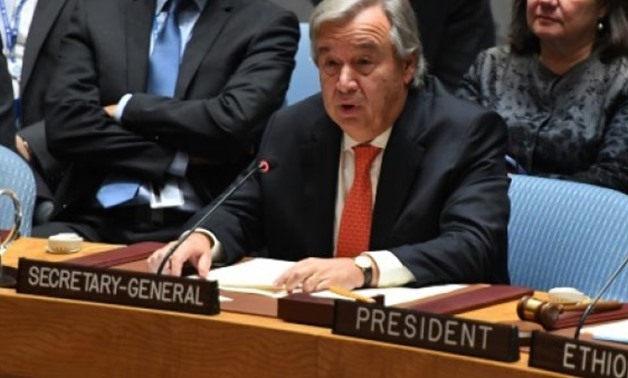
UN Secretary-General Antonio Guterres will travel to the Central African Republic - AFP/File / by Philippe RATER
CAIRO – 6 March 2021: During a phone call with United Nations Secretary-General Antonio Guterres, Egyptian Minister of Foreign Affairs Sameh Shoukry discussed the latest developments regarding the Grand Ethiopian Renaissance Dam (GERD) file, said Egyptian Foreign Ministry in a statement on Friday.
Shoukry expressed concern vis-à-vis the stalled GERD negotiations that took place under the auspices of the African Union, and reviewed the elements of the proposal submitted by the Sudan, and backed by Egypt, to develop the negotiation mechanism with the aim of engaging the international community in the talks via the formation of an international quartet led by the Democratic Republic of the Congo in its capacity as the current AU Chair, and including the United Nations, the European Union and the United States, to mediate the negotiations.
Minister Shoukry also stressed the need to launch a serious and effective negotiation process under African sponsorship and with the participation of international parties, that would result in reaching a fair, balanced and legally binding agreement on GERD filling and operation that takes into account the three countries’ interests, before the next flood season during which Ethiopia announced its intention to implement the second phase of GERD filling, as Ethiopia's initiation of this step unilaterally will have negative effects and repercussions that must be avoided by reaching an agreement on the Renaissance Dam at the earliest possible opportunity,” Egyptian Ministry Spokesperson Ahmed Hafez.
Hafez concluded his remarks by noting that the phone conversation also examined the situation in Libya and the joint efforts between Egypt and the United Nations to advance the political track in Libya, whereby Minister Shoukry affirmed the importance of holding the elections as scheduled since this step is crucial in achieving security and stability in Libya.
On Saturday, Egyptian President Abdel Fattah El Sisi will officially visit Khartoum, where he will meet with head of Sudan's Transitional Military Council (TMC), Lieutenant General Abdel Fattah al-Burhan. Both Leaders will hold a summit during which they will discuss latest developments in some regional issues, particularly the controversial dam, security in the Red Sea and situation on Sudan's borders.
Egypt and Sudan have voiced their concern about the possible harms and threats of the controversial Ethiopian Renaissance dam and how the dam will negatively after their water share of the Nile in case Ethiopia abstained from signing a binding and legal agreement on the dam operation and filling its reservoir.
Failure of reaching a binding agreement on filling and operating the dam and the refusal of providing data from the Ethiopian side will significantly negatively affect the operation of the Sudanese Roseires reservoir, said Manager of Roseires reservoir Hamed Mohamed Ali on last week.
In remarks to the Sudanese News Agency (SUNA), Ali said that the Sudanese Roseires dam will depend on the quantities of the river coming from the Renaissance Dam, and thus the absence of a binding and satisfactory agreement for all parties will constitute a great danger.
Sudan’s Roseires dam, which is located near the Sudanese border with Ethiopia, has productive and economic importance in irrigating agricultural projects along the Blue Nile and the Nile, and producing electricity, he added.
This comes while Ethiopia has frequently affirmed it would implement the second filling of the Grand Ethiopian Renaissance Dam next July under any circumstances.
Egyptian Minister of Water Resources and Irrigation Mohamed Abdel-Atti said that Sudan worried because of what happened last year when Ethiopia began filling the dam reservoir without notifying Sudan, adding that Sudan was negatively affected.
In mid-July 2020, Ethiopian authorities unilaterally carried out the first phase of the filling process with 4.9 billion cubic meters; and it is expected that the second phase of the filling would reach 13 billion cubic meters in July.
The dispute among Egypt, Sudan, and Ethiopia dates back to May 2011 when Ethiopia started building the dam; Egypt voiced concern over its water share [55.5 billion cubic meters].
As Democratic Congo is chairing the AU for the year 2021, it is attempting to revive stalling negotiations between Egypt, Sudan, and Ethiopia. However, few hours before Sisi’s official visit to Sudan, Ethoipian Minister of Water, Irrigation and Energy Seleshi Bekele said on Thursday that his country is looking forward to a “win-win solution” for the Grand Ethiopian Renaissance Dam through trilateral negotiation.
Bekele’s remarks came after he hosted a delegation from the Democratic Republic of Congo to discuss the ongoing negotiations with Egypt and Sudan to reach a deal on GERD.
In 2015, the three countries signed the Declaration of Principles, per which the downstream countries should not be negatively affected by the construction of the dam.
In October 2019, Egypt blamed Addis Ababa for hindering a final agreement concerning a technical problem, calling for activating Article No. 10 of the Declaration of Principles, which stipulates that if the three countries could not find a solution to these disputes, they have to ask for mediation.
Washington had brokered tripartite negotiations among the three countries, in the presence of the President of the World Bank (WB) starting from November 6, 2019 until February 27 and 28, 2020.
During these rounds of talks, tangible outcomes were agreed on among the three parties concerning the rules and mechanism of operating the dam and the filling process of the reservoir during drought and prolonged drought; however, an agreement was not sealed.
Constructions in the Grand Renaissance Dam started on April 2, 2011 at a cost of $4.8 billion. The dam is located on the Blue Nile with a capacity of 74 billion cubic meters and is expected to generate up to 6,000 megawatts of power.
Comments
Leave a Comment